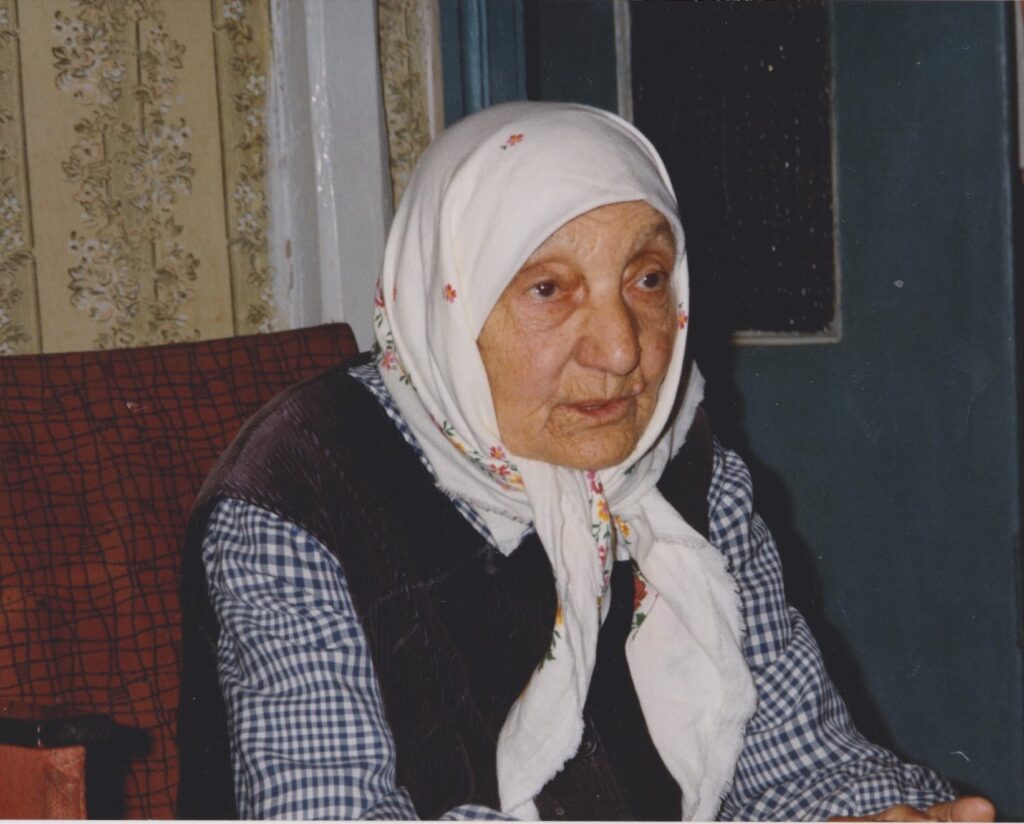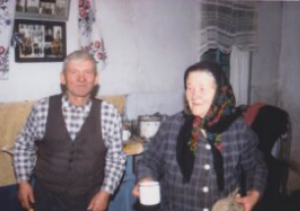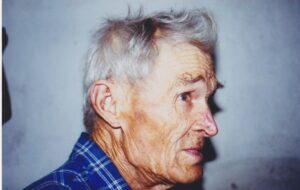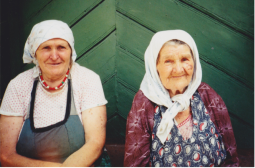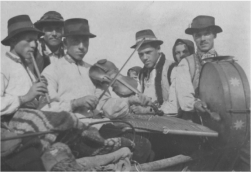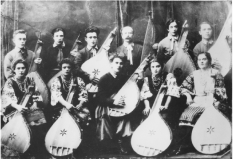Dyshliuk Yevdokia Mytrofanivna, b. 1915
—How much land did you have [1920s]?
Yevdokia Mytrofanivna: After the landowners with large holdings were evicted and the land sold to the people, we had six hectares for eight people in our family. We worked the land and sowed hemp.
—What else did you sow?
Yevdokia Mytrofanivna: Rye and wheat and the small sunflowers to make the oil that we used to fry meat. That was a real joy. And sugar—my mother would buy it only for kutia (at that time, a boiled wheat and honey/sugar mixture eaten ritually in honor of the dead).
—Was life difficult?
Yevdokia Mytrofanivna: Yes, poverty. We worked and worked all the time. Before the kolhospy, there were khaziaii that ran oil mills; people used to go there to press oil from seeds and they paid the oil mill owner for that.
—Was this in your village or did you have to go somewhere else?
Yevdokia Mytrofanivna: It was in the third village away from here.
—Your father plowed and sowed. Did he have any trade?
Yevdokia Mytrofanivna: No, he only reaped, plowed, and sowed.
—Where did you go to the market fairs?
Yevdokia Mytrofanivna: There was a small market in a nearby village and a bigger one in Shpola.
—Did you go every Sunday?
Yevdokia Mytrofanivna: No.
—How did you get there?
Yevdokia Mytrofanivna: He had horses and a cow, that’s all.
—Did you keep pigs or geese?
Yevdokia Mytrofanivna: We had pigs, and if there was a piglet, we’d eat it right away. We didn’t have any geese.
—Were you considered seredniaky?
Yevdokia Mytrofanivna: I think so.
—Who was referred to as kurkuli?
Yevdokia Mytrofanivna: Those were the ones who were dispossessed. They had a car, for example. The landowners’ fields were sold for payments to be made in installments; one had to sow and work the land.
—Did you work the land on your own or did you hire someone?
Yevdokia Mytrofanivna: We didn’t have money to pay day laborers, so we worked on our own. I was about 10 years old, but I already drove oxen on my uncle’s plow. This uncle was better off than others, and our father had a family: six children and two old people. One day when I was driving my uncle’s oxen, I fell down and the oxen stomped on my feet.
Yevdokia Mytrofanivna Dyshliuk (Cherkasy region)
—Do you remember how many people were taken to Siberia during the evictions and deportations?
Yevdokia Mytrofanivna: Not many, perhaps three families. Then they used repressions. I want to tell you about my experience of eviction and deportation. There were three categories: the rich were the first, and we were the third. The head of the village council and the head of the kolhosp came to our house, but there was nothing to confiscate. We were poor. My older brother was born in 1915; I was born in 1913. My brother had a suit, but he was away at work. My mother put the suit on in fear that it would be taken away. My brother used to wear rags, and this was a simple and clean suit; she wanted to preserve it for him. You know, they didn’t shy away from pulling my mother to the ground. They pulled up her skirt and took off the suit, both the jacket and the pants. Is it acceptable to undress a person like that? I don’t mind the kolhosp. We would have gone there and worked, but they didn’t have to destroy so many lives by starvation.
Yevdokia Mytrofanivna Dyshliuk (Cherkasy region)
—Did your parents join the kolhosp?
Yevdokia Mytrofanivna: Yes.
—Was all their property—the fields, the horses—confiscated?
Yevdokia Mytrofanivna: Yes.
—Did you father worry? Did he resist joining the kolhosp?
Yevdokia Mytrofanivna: No, he did want to join. It’s that they [the authorities] didn’t need to do it the way they did it. They imposed famine on the people and shipped away the bread. There was even a poem: “Red carts keep coming. The peasants keep delivering bread to the factory workers.” This was in our primer. My brother went to school and learned this poem. I didn’t go to school because I had nothing to wear, and we lived in a khutir five kilometers away from the school in the village. I used to weave fabrics, sew, and embroider bed sheets, and in exchange someone would buy me a shawl from the merchants (here: spekulianty). Then my father didn’t fulfill the bread production requirements of the third category. How could he if they had already taken all the grain away? So, they died of famine because they [authorities] took everything to the last crumb and sent it away somewhere.
Yevdokia Mytrofanivna Dyshliuk (Cherkasy region)
—Did the locals or the newcomers conduct collectivization?
Yevdokia Mytrofanivna: Some were locals, and some were newcomers. They sent some kind of a representative, but the rest were locals: the head of the village council and the head of the kolhosp.
—Were they Ukrainians or of other nationalities?
Yevdokia Mytrofanivna: Ukrainians and Russians; there were no other nationalities.
Yevdokia Mytrofanivna Dyshliuk (Cherkasy region)
—Did your parents go to the kolhosp?
Yevdokia Mytrofanivna: Yes, they did.
—Were their possessions taken away—the field and the horses?
Yevdokia Mytrofanivna: Yes.
—Did your father worry? Did he resist?
Yevdokia Mytrofanivna: No, he did want to join. It’s that they [authorities] didn’t need to do it the way they did. They imposed famine on the people and sent away the grain. There was even a poem: “Red carts keep coming. The peasants keep delivering bread to the factory workers.” This was in our primer. My brother went to school and learned this poem. I didn’t go to school because I had nothing to wear, and we lived in a khutir five kilometers away from the school in the village. I used to weave fabrics, sew, and embroider bed sheets, and in exchange someone would buy me a shawl from the “speculators.” Then my father didn’t fulfill the bread production requirements of the third category. How could he make it if they had already taken all the grain away? So, they died of famine because [the authorities] took everything to the last crumb and sent it away somewhere.
Yevdokia Mytrofanivna Dyshliuk
—Did the authorities build a club?
Yevdokia Mytrofanivna: There used to be a church; then it was dismantled—the cross and the domes. Someone went up to get the cross because it was made of gold or silver, I am not sure; it was yellow. After this, the large building was used for grain storage and then a club. When they were building a school there, I used to go to help—I carried bricks and clay.
Yevdokia Mytrofanivna Dyshliuk (Cherkasy region)
—How many days did your wedding last?
Yevdokia Mytrofanivna: It started on Saturday night (this was called holovytsia). The wedding was on Sunday. On Monday they take half a liter of alcohol and go to eat and drink.
Yevdokia Mytrofanivna Dyshliuk (Cherkasy region)
—Did startsi go around your village?
Yevdokia Mytrofanivna: Yes, I remember because our mother used to say, “Lock the door; the startsi are coming.” A blind man would come with his guide, carrying three bags: one for flour, another for millet, and the third for a piece of bread if people had any. He didn’t demand anything. He would come, cross himself, and pray to God, “Please give me anything you can.” People would give alms.
—Who carried the bags: the blind man or the guide?
Yevdokia Mytrofanivna: The blind man carried them around his neck.
—Did he play anything?
Yevdokia Mytrofanivna: No. On the market, we had one man who played and sang songs about the famine.
—What did he play?
Yevdokia Mytrofanivna: They said some kind of a lira (hurdy-gurdy); I didn’t see it.
—Did he sing about the famine?
Yevdokia Mytrofanivna: Yes.
—Did he sit at the market near the church?
Yevdokia Mytrofanivna: At the market. They also went door-to-door, but those people didn’t have a lira.
—Why did your mother tell you to lock the door when they were coming?
Yevdokia Mytrofanivna: I guess they didn’t take anything from the people. They could just come in and leave if the parents were not there, but they said to lock the doors.
—Were you afraid that they would want to steal something?
Yevdokia Mytrofanivna: I haven’t heard anything about stealing, nonetheless.
—Did your mother tell you that they could kidnap the children?
Yevdokia Mytrofanivna: Yes.
—Did she always give them something or did she sometimes say that she didn’t have anything to give?
Yevdokia Mytrofanivna: People gave if they had anything to spare. Those who didn’t have enough to eat did not give anything, “We don’t have anything.”
—Was it not considered shameful not to give them anything?
Yevdokia Mytrofanivna: Yes [answer not clear in the Ukrainian].
—Were the startsi men only or women, too?
Yevdokia Mytrofanivna: I don’t know.
—Did they come after the war?
Yevdokia Mytrofanivna: No, not after the war.
— Did they come during the war, during collectivization, or after the collectivization?
Yevdokia Mytrofanivna: After collectivization, they went to the kolhosp administration asking for some food to make a soup. People had vegetable gardens, but if they didn’t have any potatoes to plant, the kolhosp would give them two or three kilograms of grain. You’d get some, grind the grain, and make some food. They didn’t go around the houses asking for alms.
Yevdokia Mytrofanivna Dyshliuk (Cherkasy region)
—Describe girls’ parties.
Yevdokia Mytrofanivna: I was seventeen and I was swollen from famine in 1932–1933. The year 1933 was the worst and in 1934 we got some bran delivered from somewhere; I don’t know where it was brought from, but we ate it because we were so terribly hungry. Later on—I don’t remember what year it was—it got better, and buns could be seen lying around on the ground by the road. Before, you couldn’t find a tiny piece of bread anywhere. When I worked in the radhosp, they would make some broth for us and give us two hundred grams of bread; it was so heavy and there was so little of it. In 1933, the rain helped out. We were eating dinner; there wasn’t enough to eat, just enough to take the edge off the hunger, and the rain clouds appeared, and [?], they didn’t touch it and went home. There was nothing to eat at home.
—Then girls didn’t have any parties in 1932?
Yevdokia Mytrofanivna: Oh, no.
—What about 1934?
Yevdokia Mytrofanivna: Again, no. In 1935 or 1936 some got married.
—Were there no weddings in 1934 and 1935?
Yevdokia Mytrofanivna: No.
—What about 1932 or 1933?
Yevdokia Mytrofanivna: God forbid. It wasn’t on anyone’s mind.
—Did the girls have any parties in 1936?
Yevdokia Mytrofanivna: No, we didn’t gather for parties, but we would go to some club during the day or something like that. I didn’t go because we lived far from the village. The others went.
—Did the new authorities build the club?
Yevdokia Mytrofanivna: We had a church, so first they dismantled it; one person volunteered to climb up to remove the cross. The crosses were made of gold or silver, I don’t know; they were yellow. The rest remained, and the large church building was used for grain storage, later a club, and then a school. I used to go there to do construction work and carry bricks and construction clay.
Yevdokia Mytrofanivna Dyshliuk (Cherkasy region)
—How much land did you have [1920s]?
Yevdokia Mytrofanivna: After the landowners with large holdings were evicted and the land sold to the people, we had six hectares for eight people in our family. We worked the land and sowed hemp.
—What else did you sow?
Yevdokia Mytrofanivna: Rye and wheat and the small sunflowers to make the oil that we used to fry meat. That was a real joy. And sugar—my mother would buy it only for kutia (at that time, a boiled wheat and honey/sugar mixture eaten ritually in honor of the dead).
—Was life difficult?
Yevdokia Mytrofanivna: Yes, poverty. We worked and worked all the time. Before the kolhospy, there were khaziaii that ran oil mills; people used to go there to press oil from seeds and they paid the oil mill owner for that.
—Was this in your village or did you have to go somewhere else?
Yevdokia Mytrofanivna: It was in the third village away from here.
—Your father plowed and sowed. Did he have any trade?
Yevdokia Mytrofanivna: No, he only reaped, plowed, and sowed.
—Where did you go to the market fairs?
Yevdokia Mytrofanivna: There was a small market in a nearby village and a bigger one in Shpola.
—Did you go every Sunday?
Yevdokia Mytrofanivna: No.
—How did you get there?
Yevdokia Mytrofanivna: He had horses and a cow, that’s all.
—Did you keep pigs or geese?
Yevdokia Mytrofanivna: We had pigs, and if there was a piglet, we’d eat it right away. We didn’t have any geese.
—Were you considered seredniaky?
Yevdokia Mytrofanivna: I think so.
—Who was referred to as kurkuli?
Yevdokia Mytrofanivna: Those were the ones who were dispossessed. They had a car, for example. The landowners’ fields were sold for payments to be made in installments; one had to sow and work the land.
…………………………………………………………………….
—Did you work the land on your own or did you hire someone?
Yevdokia Mytrofanivna: We didn’t have money to pay day laborers, so we worked on our own. I was about 10 years old, but I already drove oxen on my uncle’s plow. This uncle was better off than others, and our father had a family: six children and two old people. One day when I was driving my uncle’s oxen, I fell down and the oxen stomped on my feet.
